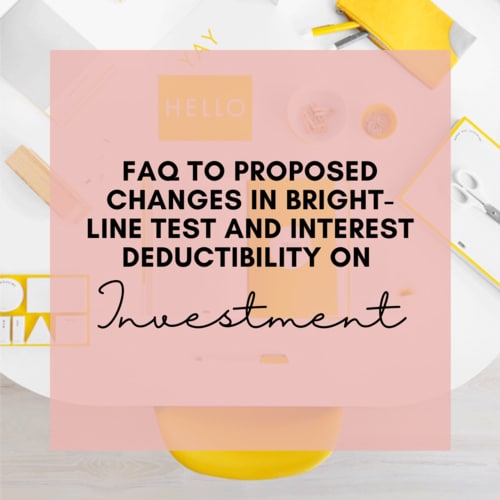Firstly, what is the bright-line test?
The bright-line test means if you sell a residential property within a set period after acquiring it you will be required to pay income tax on any profit made from the property increasing in value. The current bright-line test is 5 years. However, with the Government announcement that this will be extended to 10 years for residential property except new builds.
Inherited properties and those which have been the owner’s main home for the entire time they owned it will continue to be exempt from all bright-line tests.
We have created a table to show during which time you purchased a property and as to what period of time applies to the bright-line test:
Residential property bought between Bright-Line Test
1 October 2015 – 28 March 2018 2 years
29 March 2018 – 26 March 2021 5 years
27 March 2021 – (new builds) 5 years
27 March 2021 – (excluding new builds) 10 years
Main Home
Any residential property that has been used as the owner’s main home for the entire time they owned it will continue to be exempt from the bright-line test. The exception applies if the house is a person’s “main home” – which is a property that has been used as a main home – where you keep your stuff, where your family lives, where your social ties are strongest.
If you have a house that you’ve lived in and also rented out for more 12-months, tax is levied proportionally depending on the amount of time it’s been rented. That means for residential properties acquired on or after 27 March 2021, including new builds, the government intends to introduce a “change-of-use” rule. This will affect the way tax is calculated if the property was not used as the owner’s main home for more than 12- months at a time within the applicable bright-line period.
People can use an “own home” exclusion twice in any two-year period to avoid the bright-line test.
If you inherit a property, that also is not included.
What if I use my house for short-stay accommodation?
The legislation will also ensure that residential properties used to provide short-stay accommodation, such as Airbnb, where the owner does not live in the property, are subject to the bright-line test, and cannot be excluded as business premises.
What do the proposed changes mean for you?
-
If you acquire a residential property on or after 27 March 2021:
-
If you sell the property more than 10 years after acquiring it (or 5 years for a new build) – you will not pay tax under the bright-line test on any gain in value
-
If you sell the property within 10 years of acquiring it (or 5 years for a new build), and it was your main home for the entire time you owned it, you will not pay tax under the bright-line test on any gain in value.
-
However, if the property was your main home, but was used for other purposes for more than 12 months during the time you owned it, you will pay income tax on the profit from the gain in value of the property. For which there is a formula to calculate this.
-
Here is a point that you need to be wary of – any profit from a gain in property value that is considered taxable income (including under any of the bright-line tests) will also affect any other obligations or entitlements you have based on taxable income, such as student loan repayments, child support payments, and Working for Families. This effect would be in the year you need to include the income on your tax return.
What if I am a speculator, land developer, builder or land dealer?
There are other rules in the Income Tax Act 2007 that can tax gains on the sale of land (including residential land). For example, there are tax rules that apply to speculators, land developers and dealers. Those rules will continue to apply, regardless of when the property was purchased. The bright-line tests potentially apply only if none of the other land sale rules apply.
Regardless of the bright-line tests, anytime you purchase property with the intention of selling it you must pay tax on the profit unless an exemption applies.
Interest Deductions – how will this work?
Currently when owners of residential investment property calculate their taxable income, they can deduct the interest on loans that relate to the income from those properties (claimed as an expense). This reduces the tax they need to pay.
What the Government is proposing is that residential rental property investors will not be able to claim the interest deduction as an expense going forward.
The Government will consult on the detail of these proposals and legislation will be introduced shortly thereafter. Consultation will cover an exemption for new builds acquired as a residential investment property, and whether all people who are taxed on the sale of a property (for example under the bright-line tests) should be able to deduct their interest expense at the time of the sale.
The legislation will apply from 1 October 2021.
Interest deductions on residential investment property acquired on or after 27 March 2021 will not be allowed from 1 October 2021and is being phased out for other rental properties.
Interest on loans for properties acquired before 27 March 2021 can still be claimed as an expense. However, the amount you can claim will be reduced over the next 4 income years until it is completely phased out, as shown in the table below.
If you acquired a property before 27 March 2021, you can still claim interest (for loans that already existed for that property) as an expense against your residential property income, but this amount will reduce by 25% each income year until the ability to deduct the interest is completely phased-out from the 2025–26 income year. If you have a standard balance date, the proposed change will be phased in as follows:
Income year Percent of interest you can claim
1 April 2020–31 March 2021 100%
1 April 2021–31 March 2022 1 April 2021 to 30 September 2021 – 100%
(transitional year) 1 October 2021 to 31 March 2022 – 75%
1 April 2022–31 March 2023 75%
1 April 2023–31 March 2024 50%
1 April 2024–31 March 2025 25%
From 1 April 2025 onwards 0%
This means that in the 2025–26 and later income years, you will not be able to claim any interest expense as deductions against your income.
If money is borrowed on or after 27 March 2021 to maintain or improve property acquired before 27 March 2021, it will be treated the same as a loan for a property acquired on or after 27 March 2021. Interest on it will not be able to be claimed as an expense from 1 October 2021.
Property developers (who pay tax on the sale of property) will not be affected by this change. They will still be able to claim interest as an expense.
So how much will the tax be?
The tax rate you pay is your marginal income tax rate.
So, if you are earning at a top rate of 33 per cent rate on your normal income, you will pay 33 per cent of the capital gains on the property.
The new tax rate of 39 per cent will apply when annual income, including applicable capital gains, exceeds $180,000.








